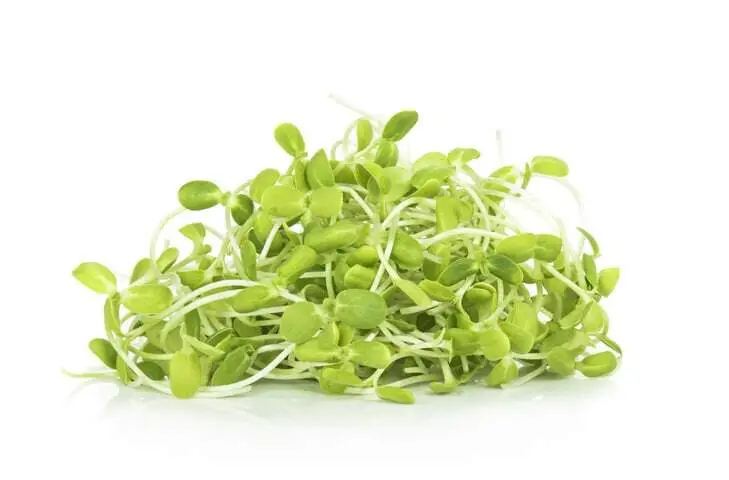Sunflower Microgreen Nutrition Fact Sheet

Sunflower microgreens, the young and tender shoots of sunflower plants, are gaining popularity for their mild flavor and impressive nutritional content. These petite greens offer a delightful addition to various dishes while providing a plethora of essential nutrients that promote overall health.
Nutrition Profile
Sunflower microgreens boast an impressive nutritional profile, making them a valuable addition to your diet. Here's a breakdown of their key nutritional components:
Vitamin C: Sunflower microgreens are a rich source of vitamin C, an antioxidant that helps protect cells from oxidative damage. A 100-gram serving of sunflower microgreens contains approximately 176% of the recommended daily intake of vitamin C for adults.
Vitamin E: These microgreens also contain vitamin E, another powerful antioxidant known for its role in skin health and immune function support. A 100-gram serving provides around 61% of the recommended daily intake.
Vitamin A: Sunflower microgreens offer vitamin A, crucial for maintaining healthy vision, skin, and immune function. A 100-gram serving contains about 37% of the recommended daily intake.
Minerals: Sunflower microgreens are a good source of essential minerals such as potassium and iron. Potassium supports heart health, while iron is essential for red blood cell formation and oxygen transport. A 100-gram serving contains approximately 11% of the recommended daily intake of potassium and 13% of iron.
Fiber: These microgreens contain dietary fiber, which aids in digestion and helps maintain healthy cholesterol levels. A 100-gram serving provides around 2.4 grams of fiber.
Health Benefits
Incorporating sunflower microgreens in the diet can be beneficial especially in deficiency states or when the intake of certain food sources is not possible. They may provide with the following health benefits:
Antioxidant Protection: The high levels of vitamin C and vitamin E in sunflower microgreens help neutralize harmful free radicals, reducing the risk of chronic diseases and promoting overall well-being.
Heart Health: Potassium and fiber content support heart health by regulating blood pressure and lowering cholesterol levels, reducing the risk of cardiovascular diseases.
Eye Health: Vitamin A in sunflower microgreens contributes to maintaining good vision and may reduce the risk of age-related eye conditions.
Immune Boost: The combination of vitamins C and E strengthens the immune system, aiding the body's defense against infections and illnesses.
In addition, some scientific studies have highlighted the potential health benefits of sunflower microgreens:
Antioxidant Properties: Research has shown that sunflower microgreens contain a variety of antioxidants, including polyphenols and flavonoids, which combat oxidative stress.
Anti-Inflammatory Effects: Sunflower microgreens possess anti-inflammatory compounds that may help reduce inflammation, potentially lowering the risk of chronic inflammatory diseases.
Antitumor Activity: Some studies suggest that compounds found in sunflower microgreens may have antitumor properties. While more research is needed in this area, early findings are promising.
In conclusion, sunflower microgreens are not only a delicious addition to your meals but also a nutritional powerhouse. Their high vitamin and mineral content, coupled with their antioxidant and anti-inflammatory properties, make them a valuable component of a healthy diet. Incorporate sunflower microgreens into your meals to enjoy their numerous health benefits while savoring their mild, fresh flavor.
References
Bhaswant, M., Shanmugam, D. K., Miyazawa, T., Abe, C., & Miyazawa, T. (2023). Microgreens—A comprehensive review of bioactive molecules and health benefits. Molecules (Basel, Switzerland), 28(2), 867. https://doi.org/10.3390/molecules28020867
Ebert, A. W. (2022). Sprouts and microgreens—novel food sources for healthy diets. Plants, 11(4), 571. https://doi.org/10.3390/plants11040571
Gai, F., Karamać, M., Janiak, M. A., Amarowicz, R., & Peiretti, P. G. (2020). Sunflower (Helianthus annuus L.) plants at various growth stages subjected to extraction—comparison of the antioxidant activity and phenolic profile. Antioxidants (Basel, Switzerland), 9(6), 535. https://doi.org/10.3390/antiox9060535
Guo, S., Ge, Y., & Na Jom, K. (2017). A review of phytochemistry, metabolite changes, and medicinal uses of the common sunflower seed and sprouts (Helianthus annuus L.). Chemistry Central Journal, 11(1). https://doi.org/10.1186/s13065-017-0328-7
Tiyayon, P., & Duangmal, K. (2018). Changes in chemical composition, minerals, total phenolic compounds and antioxidant activities during germination of sunflower sprout. Acta Horticulturae, 1213, 527–532. https://doi.org/10.17660/actahortic.2018.1213.79
Truzzi, F., Whittaker, A., Roncuzzi, C., Saltari, A., Levesque, M. P., & Dinelli, G. (2021). Microgreens: Functional food with antiproliferative cancer properties influenced by light. Foods (Basel, Switzerland), 10(8), 1690. https://doi.org/10.3390/foods10081690
Disclaimer: The information provided in this article is for educational and informational purposes only and is not intended as medical advice. It is not a substitute for professional medical advice, diagnosis, or treatment. Always seek the advice of a qualified healthcare provider with any questions you may have regarding a medical condition. The author and publisher of this article are not responsible for any adverse effects or consequences resulting from the use of any suggestions, preparations, or procedures described in this article.

